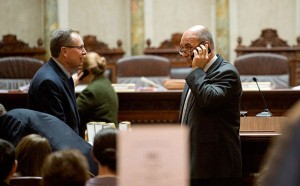Lawyer saw writing on wall for Act 10 ruling
By: Dan Shaw, [email protected]//August 1, 2014//

One of the lead challengers of Act 10 said he had a good idea which way the ruling would go well before the state Supreme Court handed down its decision Thursday.
Lester Pines, who represented the teachers union and public-employee union that brought the case, said in a news conference Thursday with reporters that he would be surprised if anyone was caught off guard by the court’s decision to uphold the 2011 law that stripped most public employees of the bulk of their collective-bargaining rights.
Pines, a partner at Madison-based Cullen, Weston, Pines & Bach LLP and a frequenter challenger of laws supported by Gov. Scott Walker, said he could tell things were not likely to go his way from comments made by certain justices when he argued the Act 10 case Nov. 11 before the court. The pessimism only became worse, Pines said, when, 10 days later, the court voted 5-2 later to vacate a contempt order Dane County Judge Juan Colas had handed down against two state employees who were enforcing parts of Act 10 that Colas previously found unconstitutional.
The five justices who sided against Pines and Colas in that earlier dispute were the same ones who ruled, in the decision released Thursday, that Act 10 was constitutional in its entirety.
Pine noted a recurring theme in the Act 10 case and two other big rulings the state Supreme Court handed down Thursday. Along with the limits on collective bargaining, the justices released rulings upholding a law requiring voters to furnish photo ID before casting a ballot and a law that accords certain legal benefits to same-sex couples.
In each of those cases, Pines noted, the justices who wrote the majority opinions argued that courts usually defer to the legislature when nothing more than doubts have been raised over the constitutionality of a new law.
“What the court repeated in all these case is that there is a heavy burden on challengers of a law who are claiming the law is unconstitutional,” Pines said. “The court has to be convinced beyond a reasonable doubt.”
In a concurring opinion Thursday that discussed the policies of Pope Leo XIII, former Wisconsin Gov. Robert LaFollette and former President Ronald Reagan, Justice Patrick Crooks wrote that he believes the state Legislature trod too heavily on labor protections when passing Act 10. Still, he wrote, he was bound by precedent to give the benefit of the doubt to lawmakers.
Pines said Thursday’s ruling likely signals that the most substantial legal wrangling over Act 10 has come to an end. But he said the resistance was not in vain. If nothing else, the long court fight has given public-sector unions time to regroup, he said, and find new ways to make their weight felt.
Pines said Act 10 was never about shoring up the state’s budget but rather depriving public-sector unions of their power. But nothing in the law, he said, prevents unions from lobbying officials, attending government meetings or supporting various political candidates. Follow @TDR_WLJDan
Legal News
- Wisconsin attorney loses law license, ordered to pay $16K fine
- Former Wisconsin police officer charged with 5 bestiality felony counts
- Judge reject’s Trump’s bid for a new trial in $83.3 million E. Jean Carroll defamation case
- Dozens of deaths reveal risks of injecting sedatives into people restrained by police
- The Latest: Supreme Court arguments conclude in Trump immunity case
- Net neutrality restored as FCC votes to regulate internet providers
- Wisconsin Attorney General asks Congress to expand reproductive health services
- Attorney General Kaul releases update at three-year anniversary of clergy and faith leader abuse initiative
- State Bar leaders remain deeply divided over special purpose trust
- Former Wisconsin college chancellor fired over porn career is fighting to keep his faculty post
- Pecker says he pledged to be Trump campaign’s ‘eyes and ears’ during 2016 race
- A conservative quest to limit diversity programs gains momentum in states
WLJ People
- Power 30 Personal Injury Attorneys – Russell Nicolet
- Power 30 Personal Injury Attorneys – Benjamin Nicolet
- Power 30 Personal Injury Attorneys – Dustin T. Woehl
- Power 30 Personal Injury Attorneys – Katherine Metzger
- Power 30 Personal Injury Attorneys – Joseph Ryan
- Power 30 Personal Injury Attorneys – James M. Ryan
- Power 30 Personal Injury Attorneys – Dana Wachs
- Power 30 Personal Injury Attorneys – Mark L. Thomsen
- Power 30 Personal Injury Attorneys – Matthew Lein
- Power 30 Personal Injury Attorneys – Jeffrey A. Pitman
- Power 30 Personal Injury Attorneys – William Pemberton
- Power 30 Personal Injury Attorneys – Howard S. Sicula











